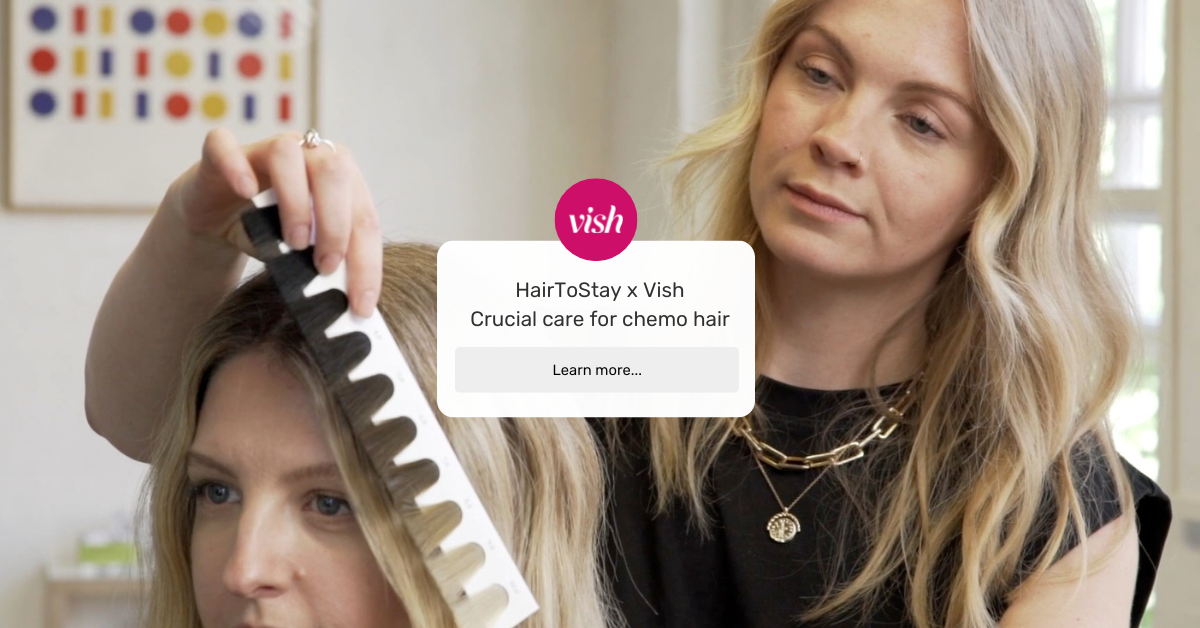Hairdressers are in the front line of caring for many people diagnosed with cancer, because to some the impact of chemotherapy on their hair is the worst part of treatment. According to HairToStay, a non-profit organization we are partnering with this October to mark Breast Cancer Awareness Month, as many as 8% of women diagnosed with cancer will actually refuse recommended treatment because of fears about hair loss, thinning, or changing texture.
Why does it happen?
Hair loss is caused by the chemo attacking fast-growing cells, which includes hair. Not all chemotherapy drugs cause hair to fall out entirely, but they can make it thinner, while curly hair can become straight and straight hair kinky. If it does fall out, it might grow back differently for a while.
Innovations in treatment
Scalp cooling has gained credibility as a treatment, and some hospitals and cancer centers have already invested in the technology. But it is still limited in accessibility. HairToStay was established in 2016, following the FDA Clearance of Scalp Cooling, in order to make the treatment available to those otherwise unable to afford it. At that time, there was no insurance coverage whatsoever, and today, coverage is still the exception, rather than the rule.
Being able to recommend scalp cooling, which reduces blood flow to the scalp and hair follicles, promotes a positive client conversation around hair loss and remedies; wearing a cooling cap just before, during, and after treatment can reduce the amount of toxins from the chemo reaching the hair. Check HairToStay on https://hairtostay.org/our-story/
Extra care with hair
But even if the chemo has no apparent effect on the hair, stylists still need to be extra vigilant. To improve the efficacy of cooling, the scalp needs to be in optimum condition, so colorants that may exacerbate dryness should be avoided. Patch testing is crucial every time as treatments can increase sensitivity to drugs previously tolerated by the client.
The advice from the medical profession when chemo is clearly affecting the hair is to avoid putting all chemicals – color, perms, relaxants, or straighteners – on the head not just during treatment but for up to six months afterward to allow the hair to recover and become stronger. Hair extensions are out as well as they can damage weakened hair.
HairToStay recommends clients avoid having their hair cut before or during the use of cold caps to limit stress on the hair, and suggests swapping to a pH-neutral shampoo with no aluminum.
Hair will recover
The good news is that hair loss or hair changes during chemo are almost always temporary. It may regrow as fine, white baby hair, taking a few months to return to normal. But this might not comfort clients devastated by the loss or potential loss of hair and that’s why Vish is partnering with HairToStay for the month of October to help raise funds for recipients receiving scalp cooling treatments. The goal is to increase awareness within the industry to help promote positive, informative, and empowering conversations with clients.
Help make a difference
To get involved in the conversation, Vish is asking the community to share your favorite hair story. Whether it’s about your own hair transformation or one you’ve helped someone else achieve, share your #hairstory on social media and tag @vishsalons to be featured.
What’s more? The Vish team is going PINK for HairToStay. At the end of the month, CIO, Tim Howard or CEO, Joshua Howard will dye their hair pink to show their support for the cause. Tune in to @vishsalons on November 1st where we’ll announce the total amount raised for HairToStay and who will be receiving this exciting color transformation!
Who do you think will be going pink? Vote here and donate today.
